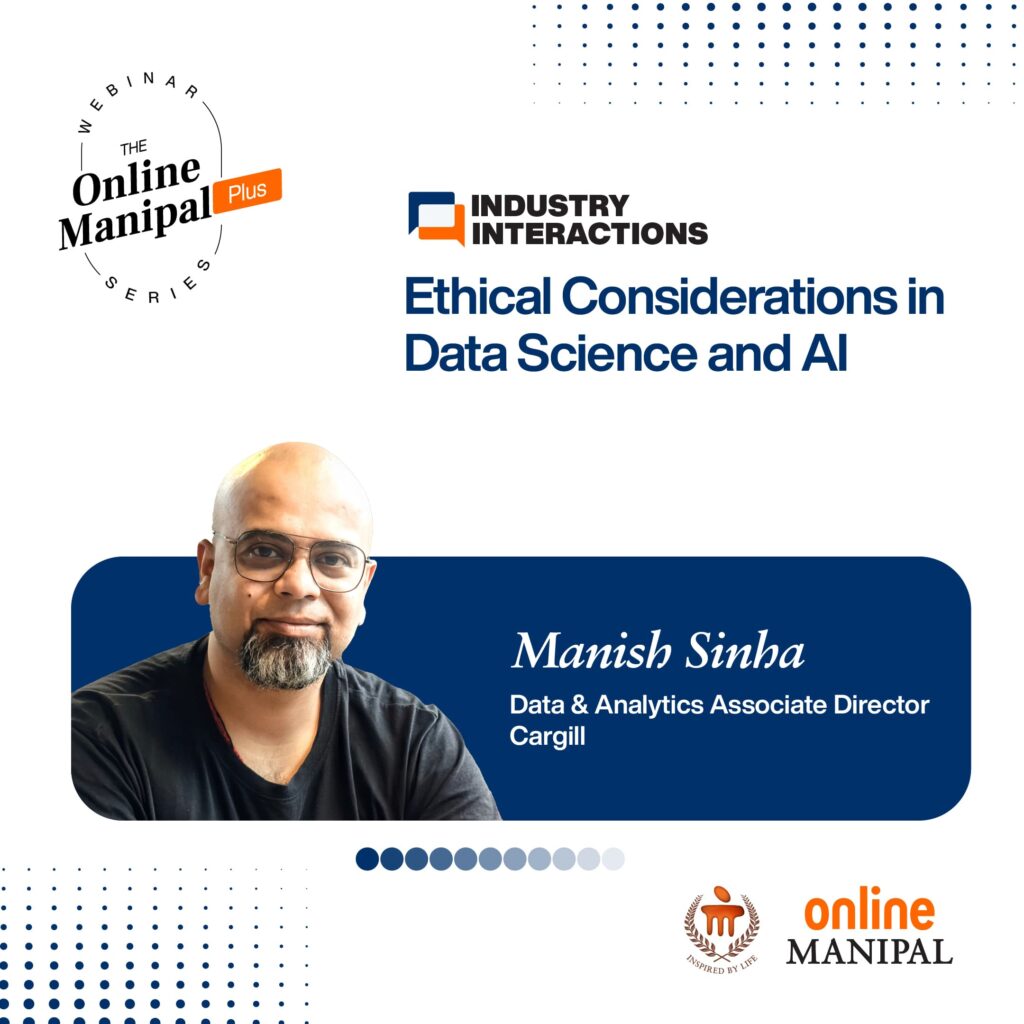Listen to this blog
In recent years, data science and artificial intelligence (AI) have transformed industries, influencing nearly every aspect of our lives—from personalized shopping recommendations to self-driving cars and predictive healthcare. However, with this tremendous power comes significant ethical responsibilities. When leveraging AI and data science, it’s essential to navigate issues like bias, privacy, transparency, and fairness with caution and integrity.
Here, we’ll explore some of the most pressing ethical considerations in data science and AI, outlining ways to address them thoughtfully and responsibly.
Understanding Bias in Data Science
Bias is one of the most critical issues in data science and AI. Since models and algorithms are often trained on historical data, they can inadvertently inherit and reinforce existing societal biases. For example, if past data reflects gender or racial bias, AI models might reproduce and even amplify these patterns.
Types of Bias:
- Data Bias: Occurs when the data used to train models is skewed or unrepresentative of the general population.
- Algorithmic Bias: Arises when the model itself, regardless of data, favors certain outcomes due to its structure or limitations.
- Human Bias: This can enter at any stage, as human assumptions and preferences guide data collection, selection, and algorithm design.
Consequences:
- Unfair outcomes in high-stakes decisions, such as hiring, lending, or law enforcement, can reinforce stereotypes and worsen societal inequalities.
Mitigating Bias:
- Use diverse, well-balanced datasets to avoid under-representation of specific groups.
- Regularly audit and evaluate models to catch any emerging biases.
- Implement fairness metrics to assess the level of bias within the system.
Effectively managing bias in data science requires a comprehensive approach, from careful data selection to continuous monitoring of model outcomes.
1. Privacy and Data Protection
Data science relies heavily on large datasets, much of which include sensitive personal information. Without stringent privacy safeguards, individuals’ data can be exploited, leading to breaches and loss of trust. Privacy isn’t only a legal requirement but a moral obligation in data-driven work.
Key Privacy Considerations:
- Data Minimization: Collect only the data necessary for the task at hand, reducing unnecessary data collection.
- Anonymization: Protect individuals by removing identifiable information.
- Transparency: Inform users about how their data is collected, processed, and used.
Privacy Safeguards:
- Privacy-by-Design principles, which embed privacy protections from the start of the design process.
- Strong encryption and data storage policies that prevent unauthorized access.
- Regular privacy impact assessments to identify potential risks and strengthen protections.
Respecting privacy builds user trust and aligns data science practices with ethical and legal standards, such as GDPR and CCPA.
You may also like to read about the top 25 data science companies in India
2. Transparency and Accountability
Transparency means that decisions made by AI systems should be understandable and explainable to those affected by them. This is especially important when AI impacts critical areas like healthcare, criminal justice, or financial services.
Why Transparency Matters:
- People need to understand how decisions that impact them are made, especially in areas with serious consequences.
- Transparency builds trust and allows users to feel more confident in AI-driven systems.
Practices for Transparency:
- Make algorithms “explainable,” so they can provide understandable reasons for their predictions or decisions.
- Use model interpretability tools to make even complex models, such as neural networks, clearer for end-users.
- Establish an open feedback system so users can report errors, and organizations can correct them.
Accountability in AI:
- Clear responsibility: Determine who is responsible for the outcomes of AI systems. This can include developers, data scientists, and the organizations deploying these tools.
- Documentation of processes: Maintain detailed records of how algorithms are developed, tested, and implemented.
Transparency and accountability help bridge the gap between powerful algorithms and the people affected by their decisions, fostering a safer and fairer AI ecosystem.
3. The Impact of AI on Jobs
One of the biggest concerns surrounding AI and automation is their potential to replace jobs. While AI has proven to be a valuable tool for boosting productivity, it can lead to job displacement, especially in fields involving repetitive tasks.
Jobs Most at Risk:
- Roles involving repetitive or routine work, such as factory workers, data entry, and customer service.
- Positions in fields like transportation and logistics, where autonomous vehicles could reduce the need for human drivers.
Balancing Automation with Job Creation:
- Encourage human-AI collaboration, where AI tools support employees rather than replace them. For instance, in healthcare, AI can assist doctors in diagnostics, speeding up processes while still relying on human judgment.
- Invest in retraining and reskilling programs to help workers transition into new roles created by AI, such as data management, AI maintenance, or analytics.
Managing AI’s impact on employment requires policies that prioritize both technological advancement and human well-being, ensuring a sustainable future for the workforce.
4. Fairness in AI-Driven Decision-Making
AI is used in making critical decisions across fields such as criminal justice, hiring, and lending. Fairness in these scenarios is essential to avoid perpetuating discrimination and inequality.
Challenges in Ensuring Fairness:
- AI often relies on historical data, which can reflect past inequalities. For instance, a hiring tool might be biased against women if it was trained on past hiring data from a male-dominated industry.
- Lack of diversity in datasets can lead to “blind spots” where certain groups are systematically disadvantaged.
Approaches to Promoting Fairness:
- Use de-biasing algorithms and fairness constraints to adjust and neutralize biased data points.
- Run “fairness audits” that test models with diverse scenarios and inputs to see if any groups are disproportionately affected.
- Ongoing monitoring and evaluation, as model outcomes can change over time as new data is introduced.
When designed and implemented thoughtfully, AI can help drive equity in high-stakes decision-making.
5. Maintaining Human Oversight: The “Human-in-the-Loop” Principle
The “Human-in-the-Loop” (HITL) principle is a model where human judgment is included in AI systems, especially in areas where ethical or safety implications are high.
Why HITL Matters:
- In complex fields like healthcare, HITL ensures that doctors can validate AI-suggested diagnoses or treatments, preventing errors and enhancing patient safety.
- In law enforcement, human oversight can prevent unfair practices by adding an additional layer of ethical consideration.
Implementing HITL:
- Ensure humans are actively involved in decision-making, especially in sensitive areas like law enforcement and healthcare.
- Make it easy for human supervisors to intervene and override AI-based decisions when necessary.
- Maintain clear guidelines to identify where human judgment is essential, ensuring AI enhances rather than replaces human intelligence.
The HITL approach balances efficiency with human ethics, adding essential checks in critical decision-making processes.
6. The Environmental Impact of AI
AI models, especially large-scale ones, require substantial computational power, which translates to high energy consumption. The environmental impact of these energy demands is often overlooked but significant.
Energy Consumption in AI:
- Training large AI models can consume as much energy as several households use in a year.
- Data centers hosting these models often rely on fossil fuels, contributing to carbon emissions.
Steps for Sustainable AI:
- Use energy-efficient algorithms that require less computational power without sacrificing accuracy.
- Opt for data centers that use renewable energy sources to power AI applications.
- Invest in model optimization techniques, like pruning and quantization, which reduce the energy consumption of large models.
Creating more sustainable AI practices helps protect the planet while advancing technology.
7. Ethical Concerns in AI for Warfare and Surveillance
AI applications in warfare and surveillance bring about some of the most controversial ethical questions. Autonomous weapons, for instance, have the potential to act without human intervention, raising questions about accountability and safety.
AI in Surveillance:
- AI-powered surveillance tools can infringe on personal privacy, with facial recognition technology being a notable example.
- There’s a risk of misuse by governments or other organizations, leading to “mass surveillance” where citizens’ activities are constantly monitored.
Guidelines for Ethical AI in Sensitive Areas:
- Establish clear international regulations to govern the use of AI in warfare, preventing misuse.
- Focus on transparency and accountability, ensuring that AI tools for surveillance respect personal privacy rights.
AI applications in high-stakes fields must have strict ethical guidelines to prevent violations of fundamental human rights.
Wrapping Up
Data science and AI have incredible potential to improve lives, but navigating their ethical complexities is crucial. Addressing issues like bias, privacy, transparency, and fairness can help create responsible AI applications that benefit society without compromising core human values. By thoughtfully addressing these ethical considerations, data scientists and AI practitioners can work toward a future where AI and data science serve as tools for positive change.
Pursuing Data Science and AI-relevant online degrees like an MBA or MCA from Manipal University Jaipur (MUJ) is a strategic step for students looking to thrive in the tech-driven future. These programs equip learners with cutting-edge analytics, machine learning, and AI skills, which are highly sought after in industries worldwide. With MUJ’s flexible online format, students can learn from expert faculty, access industry-relevant curricula, and work on real-world projects without interrupting their current commitments. These programs enhance employability and prepare students to lead innovation in emerging technologies.
Prepare for your next career milestone with us

















